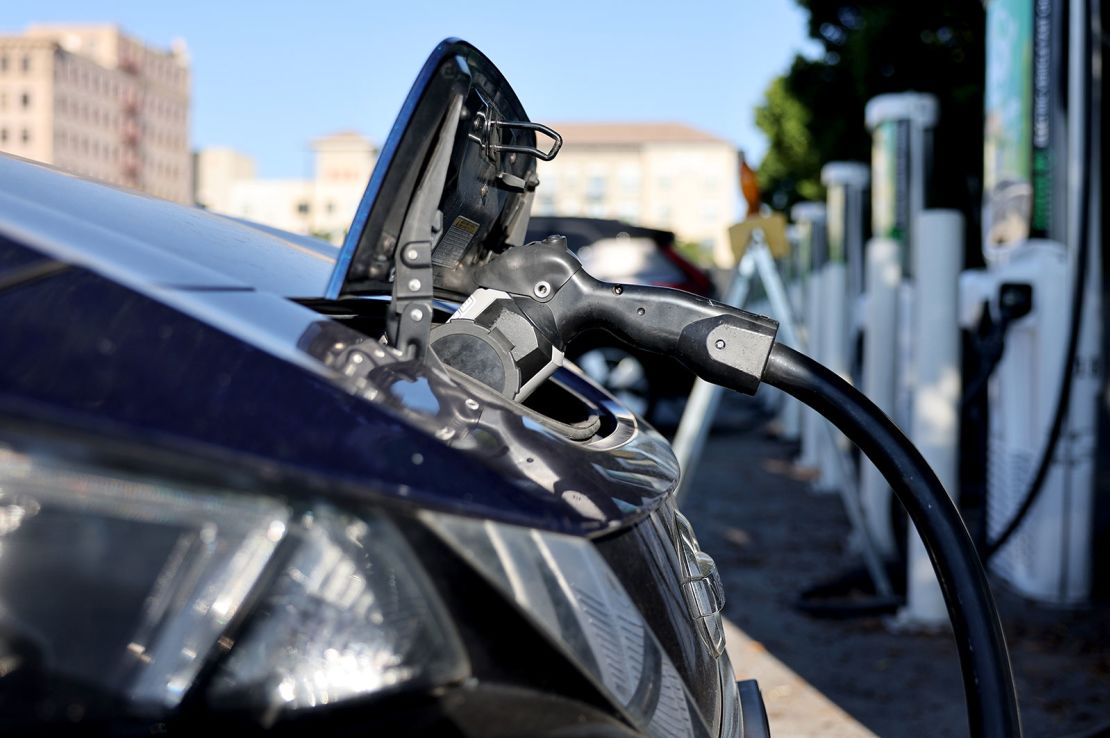[[{“value”:”
Biden’s EPA has officially permitted California to ban new gas car sales in the Golden State by 2035 to foist EVs on consumers.
In one of its last major actions on climate, the Biden administration on Wednesday finalized a key waiver allowing California to set its own vehicle pollution controls – effectively allowing the nation’s most populous state to implement its 2035 ban on selling new gasoline cars.
The Biden EPA also granted a separate waiver allowing California air regulators to significantly cut emissions of polluting nitrogen oxides from heavy trucks and off-road vehicles.
“California has longstanding authority to request waivers from EPA to protect its residents from dangerous air pollution coming from mobile sources like cars and trucks,” said EPA administrator Michael
For decades, federal law has granted California the authority to set its own vehicle emissions standards. President-elect Donald Trump revoked that authority during his first administration in 2019, but President Joe Biden reinstated it in 2022.
Later that year, California air regulators voted to phase out sales of new gas vehicles by 2035, the first regulation of its kind in the US.
The California regulations have interim standards as well: Starting with 2026 models, 35% of new cars, SUVs and small pickups sold in California will be required to be zero-emission vehicles. That quota will increase each year and is expected to reach 51% of all new car sales in 2028, 68% in 2030 and 100% in 2035. The quotas will also allow 20% of zero-emission cars sold to be plug-in hybrids.
California’s vehicle regulations matter a great deal to the auto industry because close to 20 other states and the District of Columbia have adopted them.
Yet electric vehicle advocates widely expect Trump to revoke California’s authority once he takes office in January as part of a broader rollback of Biden’s climate and pollution policies. Trump has repeatedly promised to overturn regulations to expand EVs and fuel-efficient hybrids when he takes office.
Some climate advocates remain hopeful California’s rules will still set an important example.
“Even with the first Trump administration revoking that waiver, California was able to continue driving progress in the transport sector, coming to agreements with companies that saw the writing on the wall,” said Lena Moffitt, executive director for clean energy advocacy group Evergreen Action.

The EPA is reviewing several other waivers California has in front of the agency, and is expected to make a decision on them before Biden’s term ends.
The Supreme Court declined earlier this week to take up an appeal from conservative states challenging California’s ability to establish its strict vehicle emission rules.
The move, which effectively leaves in place a lower court ruling upholding those regulations, comes days after the court agreed to hear a narrow slice of the fight: whether fuel companies have standing to sue over the regulations.
“We hope SCOTUS upholds decades of sound legal precedent, but even if they don’t, the momentum is on the side of electrification,” Moffitt said. “There will be years of litigation that once again will provide backdrop for California trying to push for progress in every way they can.”
A busy week for climate actions from Biden
The Biden administration is also out with a detailed report warning that “unfettered” development of terminals to ship liquified natural gas (LNG) overseas could raise energy prices for American consumers and add billions of tons of pollution to the atmosphere in the coming decades.
If the US increases LNG exports beyond what’s currently authorized, the resulting emissions would amount to an additional roughly 1.5 gigatons of planet-warming pollution per year by 2050, or a quarter of annual US greenhouse gas pollution, according to the report published Tuesday.
The Biden administration used the months of work on the study to justify a pause on new federal approvals for LNG terminals in January.
There will be a 60-day comment period on the report, which will bleed into the incoming Trump administration.
“The final decision is in the hands of the next administration,” Energy Sec. Jennifer Granholm told reporters. “We hope they’ll take these facts into account to determine whether additional LNG exports are truly in the best interest of the American people and the economy.”
Granholm said the study found the US government has already approved enough LNG export terminals that could ship enough natural gas “to meet global demand for decades to come.”
“The main takeaway is that a business-as-usual approach is neither sustainable nor advisable,” Granholm said. “With additional unfettered exports, wholesale domestic natural gas prices would increase by over 30% and the average American household will pay more than an extra $100 annually on their gas bills and their electric bills will likely go up as well.”
Energy Department officials said the Biden administration study can’t be altered, but the Trump administration could release their own version in the months ahead.
The LNG industry is advocating for this and also urging the Trump administration to take its time with a new study, rather than rushing to approve new export terminals on day one.
A rush to approve could hurt export terminals’ chances in the courts, where environmental groups will challenge them.
“We would obviously like to see our permits upheld in court challenges,” said Charlie Riedl, executive director for the Center for LNG, a trade group.
The post Biden Admin Grants California Permission To Ban New Gas Car Sales By 2035 appeared first on Energy News Beat.
“}]] 
